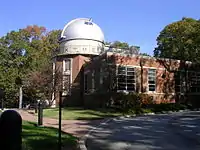Agnes Scott College
Agnes Scott College (Agnes Scott) is a private women's liberal arts college in Decatur, Georgia. The college enrolls approximately 1,000 students. Agnes Scott is affiliated with the Presbyterian Church (USA) and is considered one of the Seven Sisters of the South.[5]
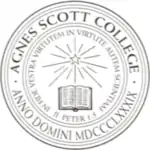 | |
Former names | Decatur Female Seminary Agnes Scott Institute |
|---|---|
| Type | Private women's liberal arts college |
| Established | 1889 |
Religious affiliation | Presbyterian |
Academic affiliations | APCU Annapolis Group Oberlin Group CIC WCC Space-grant |
| Endowment | $217.1 million (2019)[1][2] |
| President | Leocadia I. Zak |
Academic staff | 117[3] |
| Undergraduates | 1,079 (Fall 2019)[4] |
| Location | , , United States |
| Campus | Suburban; total 91 acres Athletic complex (7 acres) Bradley Observatory and Delafield Planetarium (1.5 acres) |
| Newspaper | Agnes Scott Profile |
| Colors | Purple and White |
| Athletics | NCAA Division III – USA South |
| Nickname | Scotties |
| Mascot | Scottie dog |
| Website | www.agnesscott.edu |
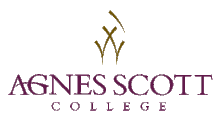 | |
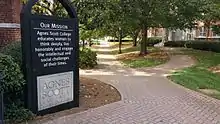
History
The college was founded in 1889 as Decatur Female Seminary by Presbyterian minister Frank H. Gaines. In 1890, the name was changed to Agnes Scott Institute to honor the mother of the college's primary benefactor, Col. George Washington Scott. The name was changed again to Agnes Scott College in 1906, and remains today a women's college.
Agnes Scott is considered the first higher education institution in the state of Georgia to receive regional accreditation.[6][7] The ninth and current president since July 2018 is Leocadia I. Zak, who previously worked as director of the U.S. Trade and Development Agency (USTDA).
On July 27, 1994, the campus was listed on the National Register of Historic Places as part of the South Candler Street-Agnes Scott College Historic District.[8] The historic district boundaries are East College Ave., South McDonough St., S. Candler St., East Hill St. and East Davis St. It includes the entire campus, as well as historic homes adjacent to the campus. The campus is also designated by the City of Decatur as a historic district.
Campus
Downtown Decatur
Agnes Scott College is located within walking distance of downtown Decatur. A MARTA subway station, located in downtown Decatur, allows students to travel to Atlanta.
Agnes Scott (Main) Hall, the oldest building on campus, was built in 1891 and once housed the entire school. This is documented in the history of Agnes Scott by Dr. McNair entitled Lest We Forget published in 1983.
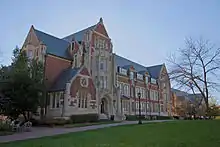
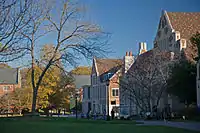
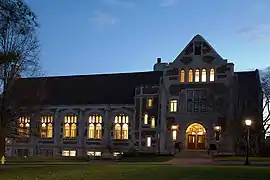
Agnes Scott occupies more than 90 acres (360,000 m2) in Decatur. The college also owns the Avery Glen apartments as well as more than a dozen houses in the surrounding neighborhoods housing faculty, staff, and students. There are also six dedicated undergraduate dormitories located on campus.
The Bradley Observatory at Agnes Scott houses the Beck Telescope, a 30-inch (760 mm) Cassegrain reflector, as well as a planetarium with 70-seat capacity and a radio telescope. Recently Agnes Scott College and the Georgia Tech Research Institute have collaborated on a project that added a LIDAR facility to the observatory.[9]
The college's science building contains a three-story rendering of part of the nucleotide sequence from Agnes Scott's mitochrondrial DNA. The DNA came from a blood sample of an ASC alumna who is a direct descendant of the college's namesake.
American poet Robert Frost was an annual visitor at Agnes Scott from 1945 to his death in 1962.[10] During his visits, he would read poetry in Presser Hall. A statue of the poet sculpted by George W. Lundeen sits in the alumnae gardens. A collection of Robert Frost's poetry and letters can be viewed at McCain Library.
The campus has been a filming location for many productions.[11] Complaints by students and alumni about disrespectful production crews and about sexist content in nonetheless rental-income-generating projects such as Road Trip: Beer Pong led to a new policy that requires school review of potential projects, responsibility training for crew members and extras, and at least one educational opportunity for students.[12]
Sustainability
Agnes Scott has committed to becoming a carbon-neutral institute by the college's 150th anniversary in 2039 and has taken steps such as partnering with the Clean Air Campaign to reduce its impact on the local environment.[13]
As of 2015, the college has five solar arrays, four of which are part of Georgia Power's Advanced Solar Initiative. The fifth array is on the rooftop of the Bradley Observatory and is also used for student research. The renovation of Campbell Hall into a mixed use residence hall, learning center, and office space was concluded in 2014 and included installation of a hydro-geothermic HVAC system.[14]
Library
The library at Agnes Scott College was an original Andrew Carnegie Library built in 1910. It was renamed in 1951 for James McCain, on the occasion of his retirement as the 2nd President of the college.
Student life
Undergraduate diversity
The fall 2019 ethnicities of the undergraduate student body: 32% African American/Black, 31% White, 14% Hispanic/Latina, 8% Asian, 6% International, 6% two or more races, and 3% other or unknown.[16]
56% of undergraduates are from Georgia.[17] The remaining come from 41 states, 2 U.S. territories, and 28 countries.[18][19]
Housing
Non-commuter students are expected to live in on-campus housing for all four years as an undergraduate at Agnes Scott College.[20] There are six resident halls situated around the Northern edge of the campus: Winship, Walters, Inman, Rebekah, Campbell and Agnes Scott Hall (nicknamed "Main"). Agnes Scott also owns off-campus apartments one block from campus called Avery Glen. Winship and Walters are traditionally reserved for first-year students. Upperclasswomen participate in a numeric room selection process, where students choose to live in loft-style dorms, tower rooms, or apartments with their friends. Single rooms are available in Inman, Main and Rebekah, while triple rooms are available exclusively in Main.[21] Beginning in August 2014, Campbell offers students suite-style rooms for four, with two students per room and a shared restroom.[22] Hopkins Hall was retired as a residence hall after the 2014–2015 academic year due to increased need for office space on campus.
Campus organizations
There are over 50 student organizations on campus.[23] Sororities are prohibited.[24]
Publications
The Silhouette is the yearbook published by the students of Agnes Scott College. All students are invited to join the staff.
Aurora is the Agnes Scott literary magazine. The magazine is published once a year and includes student poetry, prose, and artwork. The magazine has also considered publishing musical compositions.
Psychobabble is the student-run newsletter of Agnes Scott's Department of Psychology. The newsletter's goal is to create an informed and united community within the discipline by promoting coordinated activities and facilitating communication and relationships among faculty, students and staff. Psychobabble gives psychology majors and minors an opportunity to involve themselves in their interest and form an identity as undergraduate students, while benefiting the department as a whole and supporting the educational experience of their peers.
The Profile, the college's independent student newspaper, is published at the end of every semester during the academic year. All students interested in writing, photography, editing, layout and design, cartoons, advertising or circulation are encouraged to join the staff.
Athletics
Agnes Scott is a member of the National Collegiate Athletic Association Division III which fields six sports teams including basketball, cross country, soccer, softball, tennis, and volleyball. All teams compete in the USA South Athletic Conference (USA South). The tennis team is arguably Agnes Scott's most successful team, having won the conference championship and advanced to the NCAA national tournament six times: 2009, 2010, 2011, 2012, 2013 and 2015. The newest team is cross country, which was restarted in 2014 after being cut during the 2008 school year.
Agnes Scott uses the tune of the Notre Dame Victory March as their fight song and to rally the students together during the annual Black Cat Spirit Week. The Agnes Scott mascot is a "Scottie", a Scottish Terrier named Victory.
Traditions
Mascot and School Colors
The school colors of Agnes Scott are purple and white and the school mascot is the Scottie, a Scottish Terrier.
Class Colors
Each incoming class is assigned a class color—red, yellow, blue, or green—and votes on a class mascot that correlates with that color. The colors and mascots are intended to establish class pride, particularly during one week of activities called Black Cat.
Black Cat
Black Cat occurs every fall and is Agnes Scott's version of homecoming week. The week includes a number of class-focused games and activities and culminates in a series of skits written, directed, and performed by the junior class. Each class has the opportunity to showcase its mascot that features the class color. If there is dissatisfaction with a class mascot, the class is given the option to revote and choose a different mascot their second year.[25]
Pestle Board
A senior-only social and philanthropic society created to lampoon the campus chapter of the academic honor society Mortar Board. Whereas Mortar Board has strict GPA and extracurricular prerequisites for membership, Pestle Board's only entry requirement is the completion of a humorous initiation process known as "capping" that pairs junior "cappees" with graduating senior "cappers". Capping also involves Pestle Board's largest philanthropic fundraiser of the year.
Class Ring
The class ring is given to students during the spring of their sophomore year in a special ceremony. The ring is very distinctive with a rectangular engraved black onyx stone inscribed ASC and has remained essentially the same since its introduction in the 1920s with choices only in metal (white or yellow gold) and antiquing. Alumnae who wear the ring are recognizable to one another or those familiar with the college's tradition. Students and Alumnae alike dub themselves the "Black Ring Mafia".
Honor Code
The honor code is held in high regard among Agnes Scott students and faculty.[26] At the beginning of every academic year, new students must sign the honor code and recite a pledge promising to uphold the high academic and social standards of the institution.
As a member of the student body of Agnes Scott College, I consider myself bound by honor to develop and uphold high standards of honesty and behavior; to strive for full intellectual and moral stature; to realize my social and academic responsibility in the community. To attain these ideals, I do therefore accept this Honor System as my way of life.
Students self govern and ask violators of the code to turn themselves in to Honor Court. The trust the Honor Code builds between faculty and students allows for students to take self scheduled, unproctored, exams.
Senior Investiture
Senior Investiture is one of the college's most cherished traditions. During the investiture ceremony in the fall of students' senior year, each student is capped with an academic mortar board as a symbol of her senior status at the college by the Dean.
Bell Ringers
Seniors at Agnes Scott traditionally ring the bell in Agnes Scott Hall's bell tower upon acceptance to graduate school or a job offer. This tradition dates from the early 1990s after the tower acquired its bell during the administration of President Ruth Schmidt. Students who ring the bell sign their names on the walls of the tower.
Alumnae Pond
Tradition dictates that students who get engaged are thrown into the alumnae pond by their classmates.[27]
Rankings
| University rankings | |
|---|---|
| National | |
| Forbes[28] | 420 |
| Liberal arts colleges | |
| U.S. News & World Report[29] | 58 |
U.S. News & World Report's 2020 edition of "Best Colleges"
- No. 1 in Most Innovative Schools (National Liberal Arts Colleges)
- No. 4 in Best Undergraduate Teaching
- No. 25 in Great Schools, Great Prices List
- No. 58 among National Liberal Arts Colleges[30]
Princeton Review's 2019 The Best 384 Colleges ranks the college as follows:[31]
Notable alumnae
- Martha Bailey '97, professor of Economics and Scholar of how access to contraception has shaped women's lives
- Tommie Dora Barker, 1909, public librarian and founding dean of Emory Library School
- Margaret Booth (Agnes Scott Institute, d.), educational and cultural mentor for the Montgomery, Alabama area; Inducted into the Alabama Women's Hall of Fame posthumously in 1999
- Mary Brown Bullock '66, president emerita and only alumna to serve as president of the college
- Jordan Casteel, '11, award-winning figure painter[32]
- Goudyloch E. Dyer '38, Illinois state representative[33]
- Margot Gayle '31x, American historic preservationist and author who helped save the Victorian cast-iron architecture in New York City's SoHo district
- Ivylyn Girardeau 1922, medical missionary in India and Pakistan
- Mary Norton Kratt, '58, writer of Charlotte history and Southern novels.
- Kay Krill '77, president and chief executive officer of ANN INC., parent company of Ann Taylor and LOFT[34]
- Anne Harris, '91 14th president of Grinnell College, PhD from the University of Chicago and medieval art historian[35]
- Bertha "B" Holt '38 (d.), former North Carolina State Representative and children's rights advocate
- Michelle Malone '90x, musician
- Catherine Marshall '36, author of the novel Christy, later made into a TV series and A Man Called Peter
- Joanna Cook Moore, actress and mother of Tatum O'Neal
- Wasfia Nazreen, 2006, Bangladeshi mountaineer, activist, and writer
- Jennifer Nettles '97, lead singer of the AMA and Grammy award-winning country music band Sugarland
- Marsha Norman '69, playwright
- Frances Freeborn Pauley '27, civil rights activist
- Agnes White Sanford 1919, author of The Healing Light
- Saycon Sengbloh '00,[36] actress and singer[37]
- Martha Priscilla Shaw, mayor of Sumter, South Carolina (1952–1956), first female mayor in South Carolina[38]
- Cornelia Strong, 1901 (Agnes Scott Institute), professor, mathematician, and astronomer
- Jean H. Toal '65, Chief Justice of the South Carolina Supreme Court
- Leila Ross Wilburn 1904, architect[39]
- Anna Irwin Young '10 (Agnes Scott Institute, d.), professor of mathematics, physics and astronomy
References
- As of June 30, 2019. "U.S. and Canadian 2019 NTSE Participating Institutions Listed by Fiscal Year 2019 Endowment Market Value, and Percentage Change in Market Value from FY18 to FY19 (Revised)". National Association of College and University Business Officers and TIAA. Retrieved September 13, 2020.
- https://www.agnesscott.edu/about/at-a-glance/index.html/
- "Common Data Set 2015–2016" (PDF). Agnes Scott College.
- https://agnesscott.edu/about/at-a-glance/index.html
- Agnes Scott College. , Retrieved on May 15, 2013.
- "Agnes Scott College". Liberal Arts Colleges. Retrieved July 26, 2015.
- "Member List" (PDF). Southern Association of Colleges. Archived from the original (PDF) on July 22, 2011. Retrieved July 26, 2015.
- "" National Register of Historic Places: DeKalb County Retrieved: August 18, 2008.
- Lidar Projects at GTRI, Georgia Tech Research Institute, archived from the original on September 29, 2011, retrieved June 15, 2010
- "Agnes Scott College – Previous Guest Writers". www.agnesscott.edu. Retrieved December 5, 2016.
- "Filming Location Matching "Agnes Scott College - 141 E. College Avenue, Decatur, Georgia, USA" (Sorted by Popularity Ascending)". IMDb. Retrieved February 3, 2020.
- Gumbrecht, Jamie (June 15, 2009). "Spotlight not always glamorous at film-happy Agnes Scott". Atlanta Journal-Constitution. Retrieved February 3, 2020.
- New grant boosts Agnes Scott green initiatives, Agnes Scott College, January 11, 2010, retrieved February 22, 2010
- "Renewable Energy on Campus". Agnes Scott College. Agnes Scott College. Retrieved July 26, 2015.
- "Zipcar". Agnes Scott College. Retrieved July 26, 2015.
- https://www.agnesscott.edu/institutionalresearch/enrollment-history.html
- https://www.agnesscott.edu/institutionalresearch/enrollment-history.html
- https://www.agnesscott.edu/institutionalresearch/files/2018-2019-enrollment-and-retention1.pdf
- https://www.agnesscott.edu/about/at-a-glance/index.html
- Agnes Scott College Housing. , Retrieved on May 15, 2013
- "Agnes Scott College – Main Hall". Retrieved February 17, 2016.
- "Agnes Scott College – Campbell Hall". Retrieved February 17, 2016.
- "Agnes Scott College – Clubs and Organizations". www.agnesscott.edu. Retrieved December 6, 2016.
- "Agnes Scott College – Clubs and Organizations". www.agnesscott.edu. Retrieved December 6, 2016.
- "Page Not Found". Agnes Scott College website. Cite uses generic title (help)
- "Page Not Found". Agnes Scott College website. Cite uses generic title (help)
- "Agnes Scott College – Page Not Found". Agnes Scott College website. Retrieved February 17, 2016. Cite uses generic title (help)
- "America's Top Colleges 2019". Forbes. Retrieved August 15, 2019.
- "Best Colleges 2021: National Liberal Arts Colleges". U.S. News & World Report. Retrieved September 24, 2020.
- "US News College Rankings". colleges.usnews.rankingsandreviews.com.
- https://www.princetonreview.com/college/agnes-scott-college-1022900?ceid=best-colleges
- "CV". Jordan Casteel. Retrieved April 25, 2018.
- 'Illinois Blue Book 1979-1980,' biographical sketch of Goudyloch E. Dyer, pg. 149
- "Agnes Scott College – Kay Krill, President and CEO of ANN INC., Alum to Speak at Commencement". Agnes Scott College website. Retrieved February 17, 2016.
- https://www.grinnell.edu/news/anne-f-harris-named-grinnells-14th-president
- "Agnes Scott Fact Sheet" (PDF). www.agnesscott.edu. 2010.
- "Saycon Sengbloh". IMDb. Retrieved August 3, 2017.
- "Martha Priscilla Shaw Collection". Sumter County Museum. March 1999. Archived from the original on July 17, 2008. Retrieved November 21, 2009.
- Craig, Robert M. (31 July 2002). "Leila Ross Wilburn (1885–1967)". New Georgia Encyclopedia (18 September 2017 ed.). Retrieved 6 August 2020.
Further reading
- Earnshaw, Rebecca Lee. Students at Agnes Scott College During the 1930s. Decatur, GA: Agnes Scott College, 1988.
- McNair, Walter Edward. Lest We Forget: An Account of Agnes Scott College. Decatur, GA: Agnes Scott College, 1983.
- Noble, Betty Pope Scott. The Story of George Washington Scott, 1829–1903: A Family Memoir. Decatur, GA: Agnes Scott College, 2002.
- Pope, Loren. "Agnes Scott College." In Colleges That Change Lives. New York: Penguin, 2000.
- Sayrs, M. Lee. A Full and Rich Measure: 100 Years of Educating Women at Agnes Scott College, 1889–1989. Atlanta, GA: Susan Hunter, Inc., 1990.
External links
| Wikimedia Commons has media related to Agnes Scott College. |
